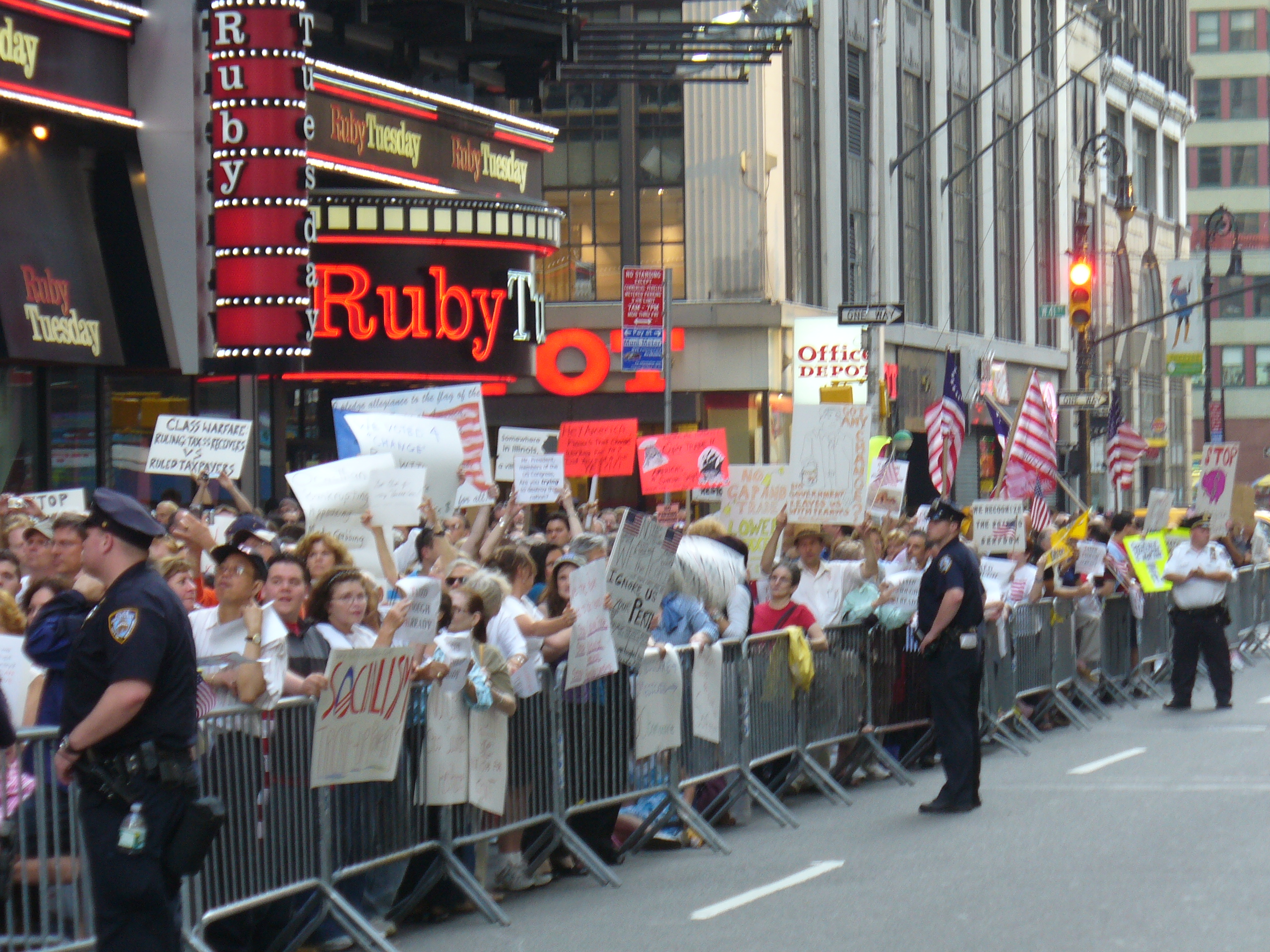MrsSpringsteen
Blue Crack Addict
Former Marine Confronts NYPD During Protest - ABC News
When retired Marine Sgt. Shamar Thomas saw New York police officers strike Occupy Wall Street protestors with a baton Saturday night, he was furious.
"Protestors were shouting things like, 'Police come join us!'," Thomas recalled in an interview with ABCNews.com. Instead, the police started moving closer and closer to the crowd. Soon, pushing and shoving started.
"I saw a woman and a man getting hit with a baton. That infuriated me," he said. This prompted him to unleash verbal fury on stunned police officers, who stared at him blankly as he shouted to them repeatedly, "These are unarmed people. It doesn't make you tough to hurt these people."
Thomas' plea, captured on video by Jannah Handy, Thomas' aunt and an Occupy Wall Street protester, has already garnered more than 750,000 hits.
That wasn't the first time he saw violence break out during the protests. The first time he went to a protest was October 5. He had taken a video then, while he was trying to reason with the NYPD.
"When I was there on October 5, I took a video that was posted before this [most recent one]. I tried to reason with NYPD, but they weren't taking me seriously, they weren't really receptive," he said. But he said on Saturday, they were "going to have to hear my voice. I wasn't going to hold any punches this time."
Thomas said when he came back last Saturday, he was "acting like an onlooker."
"To see the [brutality] happen again, in front of me, was unbelievable," he said. At least one NYPD officer has been disciplined by the department for his actions against protestors. According to a source, the senior police officer used pepper spray against a group already corralled by police.
During one of his two tours to Iraq in 2004 and 2006, he remembers seeing a fellow Marine get hit in the face with a rock thrown by an unarmed Iraqi civilian.
"I was literally involved in a riot where I saw a Marine get hit in the face with a rock. He literally fell off the truck and we didn't go into the crowd and start beating people -- our mission is to win the hearts and minds, we didn't attack the people. And to see the NYPD now hurting unarmed civilians, and these people were not even throwing rocks, it didn't make any sense to me," Thomas said.
ABCNews.com reached out to the NYPD for a response. The department confirmed they received the request for a response. However, none was received by the time this article went to publish.
Thomas said what prompted his involvement in the Occupy Wall Street protests initially was his desire to inspire change and end corporate greed and wealth disparity within America.
He blames this greed for his stepfather -- a U.S. veteran who served for over 24 years, including in Afghanistan -- being unable to find a job. He believes that if the government would give money back to citizens versus bailing out big banks, people like his father wouldn't have to struggle so hard.
"Give people opportunity, there's no hope for people," he said. "I'm not asking for handouts. I was getting $1900 a month to fight for the country, but now I can't even get a tooth fixed?"
"If my stepfather is still looking for a job," he said, "Well, Christmas is not looking too good." His mother is a disabled veteran who served as a non-commissioned officer in logistics, including in Iraq. She was awarded a bronze star for her service, Thomas said.
Thomas himself is a retired veteran, having served four years active duty, and four years inactive. He is currently a student at the Nassau Community College, studying sociology and criminal justice.
He is adamant about not aligning himself with a political affiliation.
"American people get caught up into these political groups and political involvements, when they should just vote in the best interests in themselves," he said. Thomas said he hoped to inspire a nation of freethinkers. But right now, he is at least already inspiring other veterans.
"Many veterans have contacted me, many guys from my old unit, they support me," he said. Thomas served with the 1st Light Armored Reconnaissance Battalion.
Perhaps Thomas is not aware of how many others he has inspired. He seemed unaware that a Facebook page has started under his name.
"Already? You're lying!" he exclaimed when ABC News told him the page existed. "Send me the link! I have to get on to that really quickly. I can't believe they jumped the gun on me!"
When retired Marine Sgt. Shamar Thomas saw New York police officers strike Occupy Wall Street protestors with a baton Saturday night, he was furious.
"Protestors were shouting things like, 'Police come join us!'," Thomas recalled in an interview with ABCNews.com. Instead, the police started moving closer and closer to the crowd. Soon, pushing and shoving started.
"I saw a woman and a man getting hit with a baton. That infuriated me," he said. This prompted him to unleash verbal fury on stunned police officers, who stared at him blankly as he shouted to them repeatedly, "These are unarmed people. It doesn't make you tough to hurt these people."
Thomas' plea, captured on video by Jannah Handy, Thomas' aunt and an Occupy Wall Street protester, has already garnered more than 750,000 hits.
That wasn't the first time he saw violence break out during the protests. The first time he went to a protest was October 5. He had taken a video then, while he was trying to reason with the NYPD.
"When I was there on October 5, I took a video that was posted before this [most recent one]. I tried to reason with NYPD, but they weren't taking me seriously, they weren't really receptive," he said. But he said on Saturday, they were "going to have to hear my voice. I wasn't going to hold any punches this time."
Thomas said when he came back last Saturday, he was "acting like an onlooker."
"To see the [brutality] happen again, in front of me, was unbelievable," he said. At least one NYPD officer has been disciplined by the department for his actions against protestors. According to a source, the senior police officer used pepper spray against a group already corralled by police.
During one of his two tours to Iraq in 2004 and 2006, he remembers seeing a fellow Marine get hit in the face with a rock thrown by an unarmed Iraqi civilian.
"I was literally involved in a riot where I saw a Marine get hit in the face with a rock. He literally fell off the truck and we didn't go into the crowd and start beating people -- our mission is to win the hearts and minds, we didn't attack the people. And to see the NYPD now hurting unarmed civilians, and these people were not even throwing rocks, it didn't make any sense to me," Thomas said.
ABCNews.com reached out to the NYPD for a response. The department confirmed they received the request for a response. However, none was received by the time this article went to publish.
Thomas said what prompted his involvement in the Occupy Wall Street protests initially was his desire to inspire change and end corporate greed and wealth disparity within America.
He blames this greed for his stepfather -- a U.S. veteran who served for over 24 years, including in Afghanistan -- being unable to find a job. He believes that if the government would give money back to citizens versus bailing out big banks, people like his father wouldn't have to struggle so hard.
"Give people opportunity, there's no hope for people," he said. "I'm not asking for handouts. I was getting $1900 a month to fight for the country, but now I can't even get a tooth fixed?"
"If my stepfather is still looking for a job," he said, "Well, Christmas is not looking too good." His mother is a disabled veteran who served as a non-commissioned officer in logistics, including in Iraq. She was awarded a bronze star for her service, Thomas said.
Thomas himself is a retired veteran, having served four years active duty, and four years inactive. He is currently a student at the Nassau Community College, studying sociology and criminal justice.
He is adamant about not aligning himself with a political affiliation.
"American people get caught up into these political groups and political involvements, when they should just vote in the best interests in themselves," he said. Thomas said he hoped to inspire a nation of freethinkers. But right now, he is at least already inspiring other veterans.
"Many veterans have contacted me, many guys from my old unit, they support me," he said. Thomas served with the 1st Light Armored Reconnaissance Battalion.
Perhaps Thomas is not aware of how many others he has inspired. He seemed unaware that a Facebook page has started under his name.
"Already? You're lying!" he exclaimed when ABC News told him the page existed. "Send me the link! I have to get on to that really quickly. I can't believe they jumped the gun on me!"





